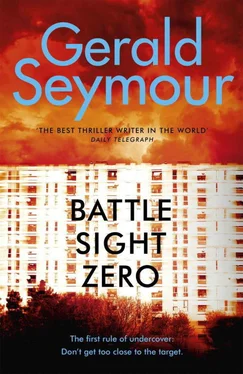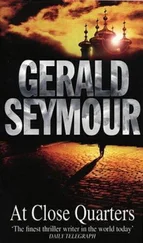What hung in the air, like smoke from the oil drums where rubbish was burned when there was no wind, was the knowledge that a dire punishment was about to be visited on a wretch who had allowed arrogance or pills or stupidity to mess with an assault rifle. The rifle was part of the armoury owned by Karym’s elder brother. The weapons were not stored in one place, but were kept in various safe houses, watched over by the nourrices , the ‘nannies’, women with no criminal record. A boy who was a braggart, pumped up with the sensation of carrying a loaded Kalashnikov taken from his mother’s store, had walked through the project, firing off shots. Hamid had retrieved the rifle. The ‘nanny’ had led away her son… there would be retribution and the imposition of discipline. It was what happened, it was normal. The mother would already have tried to open channels to Karym’s brother, perhaps through a schoolmaster, or with an imam, or any figure who had age and status.
With a population of nearly 7000, La Castellane was the work of a celebrated community architect. Once, half a century before, it had been a source of pride, admiration; now, it was known for unemployment, drugs, prostitution, arms trafficking, anything to do with the black economy. Turf wars were fought with the intensity the rats would have used. Newspapers in the Marseille area described it as a ‘supermarket’ for all things criminal. Three networks controlled the various trades: the ‘place de Merou’, the ‘Tour K’, and ‘La Jougardelle’, but below those feral power bases were individuals who had obtained franchises and paid tithes for the privilege of operating… It was the same in all the projects, and one of those, operating out of a stairwell, was under the power of Hamid, brother of Karym. His world was one of gaunt towers peppered with narrow windows and disfigured by satellite dishes, narrow walkways and dense heaps of concrete buildings that strangers would find impossible to navigate. There, his power base, Hamid could turn over some 50,000 euros each day and customers would come from across the region, and some would buy small for their own consumption, and some would buy big and then sell on in German cities, or to the Dutch market, or take the arrangement across the Channel and market it to the British.
Karym, his antennae twitching, watched, waited, as the tension built. Growing in strength, the wind funnelled between the buildings and chivvied rubbish into corners, and the sunlight made stark shadows from the few trees surviving in the open spaces, and the washing flapped on its lines and seemed to cry.
The boy who had taken the Kalashnikov and who had ambled around in the project had not been seen. But his mother had been noticed as she flitted between those whom she believed might influence what would happen to her son. Where was he? Hiding in his room, perhaps smoking as if that were a release from the fear, and unable to flee because there was no world for him outside the project. His family was in La Castellane, every person he knew was there. He could not pitch up in Saint-Barthélemy, or La Paternelle or La Bricarde, and knock on a door and ask for refuge. Could not go to a gendarmerie down the road and towards the airport or up by the big school and request food and lodging and protection and offer to name names and… The boy would have to hope that his mother came up with something, and would be sitting on his bed and looking from a high window and might see the sea, and the blue between the white caps of the waves, and might see the cleanness of the sky, and might think everything was beyond his reach.
On earphones, Karym listened to music. It was still early in the day. Night was the time that the customers came, parked in the main road, left vehicles with the engines ticking over and hurried through the checks and were directed to the rabbatteurs and be sold the goods and hand over the money. The police were not there often. The chances of infiltration were slim – this was an area skilled in the recognition of the ‘pigs’. There were informers, occasionally, who had taken the police money – never much – and who lived short and dangerous days. Recently, the police had dressed up two of their men in full-length Arab clothing and had sent them into La Castellane to arrest a ravitailleur , a supplier, and their suspect had run, and the crowd had gathered and the police had legged it, scampered for their lives, their robes billowing behind them. The music Karym listened to was from across the sea, from Tunisia where his father lived: never seen, did not write or telephone, never sent money. The music beat in his head. He was one of many who watched the entrance to the project. Later, when darkness came, he would be busy, alert. He had a grievance with the boy who had taken the Kalashnikov rifle stored by his mother. A sharp grievance.
He had never fired one. Had never peered with his right eye down the barrel, locking on the V and the needle, with the setting at Battle Sight Zero. Had never slid his finger inside the guard and wrapped it on the trigger and squeezed until there was the clap of the explosion and the thud of the recoil in his shoulder. Had never done it. Hamid said that his weak arm would not be strong enough to hold and aim and fire… But he was an expert on the weapon. Of the one hundred million that were believed to have been manufactured, Karym could name the principal factories where the Russians had produced them and all the other copies had been made: Russia, Poland, Romania, Bulgaria, Hungary, old East Germany, Finland, Serbia… knew them all, those and many others. Knew the calibre of the ammunition and the weight of grain that propelled the bullets. Knew the weapon’s effective range. Knew the art of stripping one, and reassembling it, could do it blindfolded. But had never fired one in practice or in anger… It was a grievance and it festered… He could tell the Chinese one from the Egyptian one, and both from the Iraqi one. Knew everything, except how it felt when the impact careered into the shoulder joint. The kid, an idiot, knew more of the Kalashnikov, the AK-47, than Karym did and had fired it – and would face a terrible retribution for taking it from his mother’s safekeeping. There was little forgiveness in the project, clemency came rarely to La Castellane, and the boy was a walking dead. Karym heard his music and absorbed the atmosphere around him. His brother had gone to Marseille to meet a man: had not shared the details. He had never seen rats fight but imagined it to be dramatic, but had seen a walking dead, had watched, and knew the smell of it.
The wind blew more fiercely, but could not remove the atmosphere of spectacle and anticipation, and a clock ticked.
He was in his bedsit with a grip bag on the bed, and a plastic sack.
Andy cleared drawers.
Most of his clothes went into the sack, and a few – what he’d need for a week – were laid more carefully in the grip. Shoes, trousers and overalls, underwear and socks, sweaters and his second anorak, and his sponge bag, and the little bedside clock with the built-in alarm went in to the plastic bag because he would have no need of them down in the south of France. He was meticulous. Each cupboard and drawer was checked, double-checked, and he’d been down on his hands and knees to look under the bed. When he chose to, he could close the door after him and hear the lock in the catch and go down into the hallway and know that nothing of Andy Knight was left behind for a stranger to find… They’d come looking, too right. Would look, maybe in a fortnight or a month, and curse and swear and damn him, would find nothing. He’d see her tomorrow, after the car had been tuned up, would talk with her and get the schedule: where they were going and when.
Читать дальше












